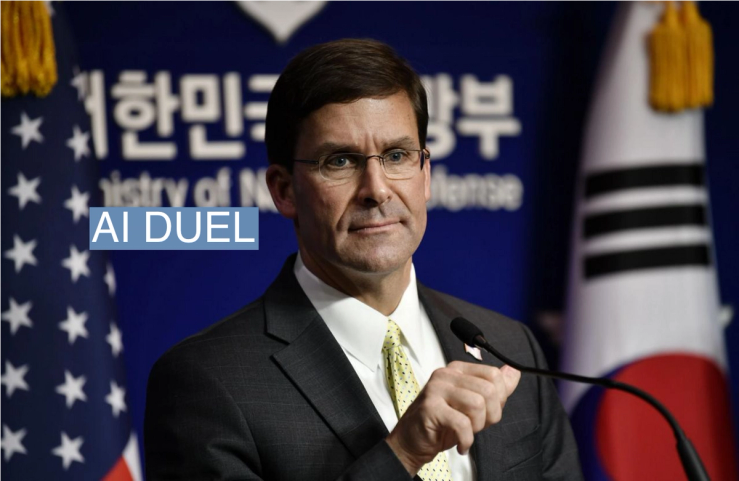The News
The U.S. is once again in an Oppenheimer-like existential struggle — but this time with China for dominance in the field of artificial intelligence, former Defense Secretary Mark Esper said in an interview.
“AI is going to fundamentally change our way of life. It’s going to change how you do your business in the media. It’s going to change DOD. It’s going to change multiple fields and industries,” Esper told me on Tuesday. “We need to get there first and then we need to dominate that space.”
Esper is among a growing number of former Pentagon officials and defense personnel who are plunging into the high-tech space in an effort to rapidly develop AI and machine-learning tools for integration into the U.S. military. The former Raytheon executive, now at the head of a new business venture, stressed that Beijing is currently outspending Washington on AI investments by a factor of three to one. And he said the Pentagon’s Byzantine procurement process must be streamlined to advance the effectiveness of U.S. weapons systems.
“The United States does not have an innovation problem. We’re the most innovative country in the world,” Esper said. “But DOD has a tough time adopting that innovation.”
Jay’s view
Esper — who last year became chairman of the national security practice at Red Cell Partners, a tech incubator focusing on the security and health care sectors — has obvious reasons to push greater integration of AI startups with the military, given his new job, but faces an uphill task.
He argued that Silicon Valley had been wary of doing national security work in past years because of both ideological and business reasons. But he said this was changing as the tech industry recognizes the scale of the China challenge for the U.S., and the potential for AI in both military and commercial ventures. He led a task force at the Atlantic Council this year that produced 10 recommendations on how to better integrate AI and high tech into the military. These included allowing the Pentagon to more directly run a staple of portfolio investments through executive officers and for Congress to allow for more flexibility in the funding of new weapons systems.
Esper said the battle with China for dominance in AI will play out over decades and might be harder to assess than previous geopolitical struggles. The U.S. was the first to detonate an atomic weapon, beating the Nazis and Soviet Union in the effort to build the bomb, making it the clear-cut victor. But the new technology competition might be more episodic.
“I think it’s going to be an ongoing race for dominance, for mastering these technologies,” Esper said. “And it’s important that not just we do it, but we do it with our other Western democracies.”
Still, the U.S. defense industry will be hard to revolutionize, given its size, the scale of its entrenched players, and the divide that’s developed between the national security and technology communities. Also, senior Pentagon officials haven’t had the best track record of transitioning into investing and startups: Among those who served on the board of Theranos — the scandal-wracked blood-testing company whose founder was imprisoned for defrauding investors — were former defense secretary William Perry, and James Mattis, a four-star general who would go on to become defense secretary himself.
Know More
Red Cell — whose staff includes a long list of retired Pentagon leaders, technologists and computer engineers, such as former vice chairman of the Joint Chiefs of Staff, Gen. Paul Selva; Vice Adm. Raquel Bono, a one-time head of the Defense Health Agency; and Adm. Bill Lescher, former vice chief of naval operations — points to a number of early-stage AI firms as evidence of its growing collaboration with the Pentagon.
Among them are DEFCON AI, which in November signed a $5 million contract with the Air Force to use AI and machine learning to improve and streamline logistics for military missions. This includes possible operations against China, which would likely require moving large numbers of American troops and military equipment into the Pacific: Selva, DEFCON AI’s chief strategy officer, told me that AI will help Pentagon planners manage with much greater speed and accuracy the shifting variables involved in the Indo-Pacific, whether its geography, weather, or military threats.
Two other Red Cell incubations, Tara Mind and Zephyr AI, are using AI and machine learning to find better medical solutions and therapies for military veterans. Red Cell made an initial investment of $3 million into Tara Mind this April. The company has been particularly focused on studying the use of psychedelic drugs to help soldiers deal with depression, anxiety, and post-traumatic stress.
The View From China
China is on the cusp of becoming more advanced than the U.S. in certain facets of AI when it comes to its military uses, particularly visualization and surveillance, which Esper put down to the Communist Party’s massive domestic spying operations. The U.S., by contrast, is ahead in using these technologies for language purposes, among others.
China’s military advantage on AI comes down in many ways to pure spending. Tech firms tracking these investments, such as Scale AI, estimate the People’s Liberation Army is investing between 1%-2% of its overall budget on AI development, compared to the Pentagon’s 0.1% to 0.2%. “The Chinese Communist Party deeply understands the potential for AI to disrupt warfare, and is investing heavily to capitalize,” Scale AI CEO Alexandr Wang told Congress last week. “AI is China’s Apollo project.”
Beijing’s Communist government also has the power to forcibly integrate the private sector’s technological advances into the military, while the U.S. has a clearer divide between the Pentagon and Silicon Valley. China watchers note that the PLA is taking special steps to promote and honor the technology innovators amongst its ranks: This month, it gave special burial honors to a mid-ranking colonel who helped develop AI-powered war gaming tools.
Room for Disagreement
Leading technologists have called for a pause on major AI projects, citing the risks they believe the technology poses to society. “Powerful AI systems should be developed only once we are confident that their effects will be positive and their risks will be manageable,” the Future of Life Institute said in an April open letter.
The Pentagon isn’t buying it, particularly in light of China’s advances. “Artificial intelligence machine-learning is something that is resonant today and is something that our adversaries are going to continue to look to exploit,” General Paul Nakasone, who heads U.S. Cyber Command, testified before Congress in May.
Notable
- The Pentagon said last month that it’s committed to “ethically” using artificial intelligence.
- Paul Scharre of the Center for a New American Security assesses how AI is dominating the U.S.-China competition.


